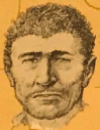This article has multiple issues. Please help improve it or discuss these issues on the talk page. (Learn how and when to remove these messages)
|
Micajah "Big" Harpe | |
|---|---|
 No known portrait of Micajah Harpe exists from life. An artist likeness created from his physical description mentioned in historical records.[1] | |
| Born | Joshua Harpe Before 1768 (probably c. 1748) |
| Died | August 24, 1799 (aged 31–51) Webster County, Kentucky, United States |
| Cause of death | Murder by decapitation with knife |
| Other names | Micajah Harpe, Micajah Roberts |
| Occupation(s) | Bandit, highwayman, river pirate, plantation overseer, soldier, frontiersman |
| Spouses |
|
| Children | 4 |
Wiley "Little" Harpe | |
|---|---|
 No known portrait of Wiley Harpe exists from life. An artist likeness created from his physical description mentioned in historical records.[1] | |
| Born | William Harper Before 1770 (probably c. 1750) |
| Died | February 8, 1804 (aged 34–54) |
| Cause of death | Execution by hanging |
| Other names | Wiley Roberts, John Setton, John Sutton, John Taylor |
| Occupation(s) | Bandit, highwayman, river pirate, plantation overseer, soldier, frontiersman |
| Spouse | Sarah "Sally" Rice (m. 1797) (shared by both brothers) |
| Children | 4 |
Micajah "Big" Harpe, born Joshua Harper (before 1768 – August 24, 1799), and Wiley "Little" Harpe, born William Harper (before 1770 – February 8, 1804), were American murderers, highwaymen and river pirates who operated in Tennessee, Kentucky, Illinois and Mississippi in the late 18th century. They are often considered the earliest documented serial killers in United States history.[2]
Loyal to the British Crown during the American Revolution, the Harpes became outlaws after the war and began robbing and killing settlers in the remote frontier west of the Appalachian Mountains. They are believed to have killed 39 people, and possibly as many as 50. As the Harpes' crimes gained notoriety, vigilante groups formed to avenge their victims, and they were eventually tracked down and executed around the turn of the century. Their savagery has since entered American folklore,[3] appearing to have been motivated more by blood lust than financial gain.
- ^ a b Cite error: The named reference
Arthur H. Clarkwas invoked but never defined (see the help page). - ^ Schram, Pamela J.; Tibbetts, Stephen G. (2014). Introduction to Criminology: Why Do They Do It?. Los Angeles: Sage. p. 51. ISBN 9781412990851.
- ^ Smith, T. Marshall. Legends of the War of Independence, and of the Earlier Settlements in the West. Louisville, KY: J.F. Brennan, Publisher, 1855.
